Fostering Emotional Resilience in Senior Care
As the aging population grows, healthcare providers and caregivers are seeking innovative approaches to improve mental health and emotional well-being among seniors. Incorporating mindfulness into senior behavioral health care emerges as a promising strategy that not only addresses psychological challenges but also enhances overall quality of life. This article explores how mindfulness practices can be effectively integrated into senior routines, supported by evidence-based research and practical techniques tailored for older adults.
Integrating Mindfulness into Daily Senior Care Routines

How can mindfulness be integrated into senior care routines to promote mental wellness?
Incorporating mindfulness into the daily routines of seniors is an effective way to enhance their mental health and overall well-being. Simple practices such as guided meditation, mindful breathing, body scans, and mindful movement can be seamlessly added to daily schedules.
Guided meditation sessions, whether led by a trained instructor or through virtual apps, can help seniors center their thoughts and cultivate relaxation. Starting with short, 5-10 minute sessions allows seniors to gradually become accustomed to the practice. Over time, increasing the duration and frequency can deepen benefits.
Mindful breathing exercises are easy to do and require no special equipment. Seniors can focus on slow, deep breaths to calm the nervous system, especially during stressful moments or before sleep. Body scan techniques, involving paying close attention to sensations across different parts of the body, promote relaxation and bodily awareness.
In addition, mindful movement activities like chair yoga, gentle stretching, or walking can improve physical health while promoting a present-moment focus. These can be incorporated during regular activity periods, encouraging movement and mental clarity.
Creating a calm and inviting environment is crucial—soft lighting, soothing music, and quiet spaces help foster a peaceful atmosphere for practice. Group classes or virtual guided sessions can foster social connection, motivation, and shared experience among seniors.
Adapting mindfulness techniques to individual abilities ensures accessibility, whether a senior has mobility issues or cognitive challenges. Activities like listening to nature sounds, engaging in mindful gardening, or using simple tactile exercises also support inclusion.
Integrating mindfulness into everyday activities—such as mindful eating, listening to music, or engaging in hobbies—enhances present-moment awareness. For example, paying attention to the sensations and flavors during meals encourages savoring and gratitude.
Consistency is vital. Regular practice fosters emotional resilience, reduces stress and anxiety, and boosts cognitive functions like memory and attention. When incorporated thoughtfully, these routines contribute significantly to healthier aging by supporting mental stability, emotional balance, and physical health, ultimately improving seniors' quality of life.
Practical Mindfulness Exercises for Seniors
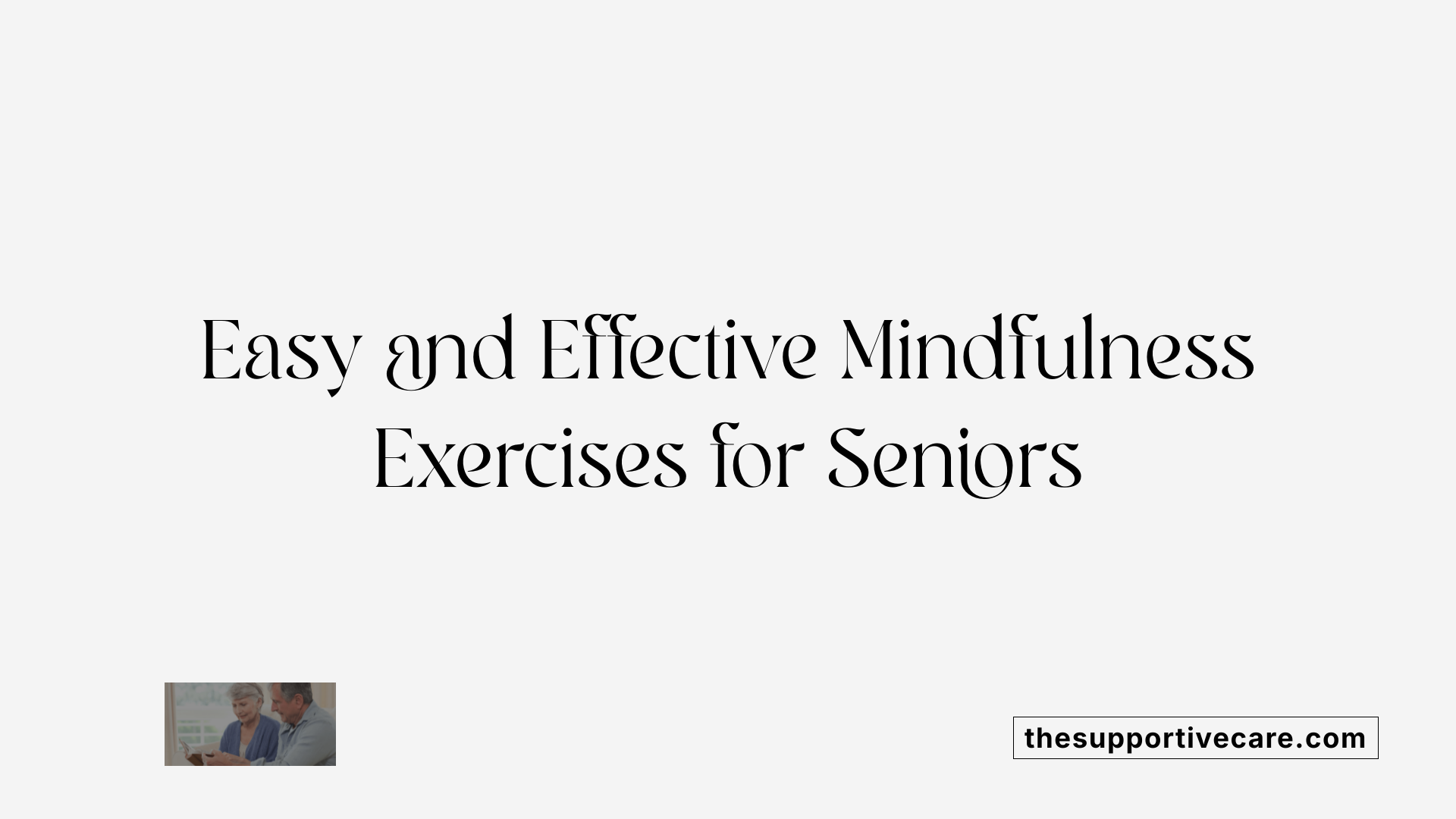
What are some practical mindfulness exercises suitable for seniors?
Many mindfulness techniques can be adapted to fit seniors' needs, promoting relaxation, emotional stability, and physical health. One simple and effective exercise is mindful breathing, especially belly breathing. This involves focusing on each inhale and exhale, expanding the abdomen gently, and calming the nervous system.
Gentle movement activities, like mindful walking or walking meditation, encourage awareness of sensory experiences such as sights, sounds, and the feeling of the ground beneath the feet. These practices can be done outdoors in nature or indoors if preferred.
Body scan exercises help seniors relax and become aware of bodily sensations from head to toe. By slowly directing attention to different body parts, they can reduce tension and improve bodily awareness.
Connecting with nature through gardening, listening to natural sounds, or engaging in outdoor walks can deepen mindfulness and foster a sense of peace. These activities promote present-moment awareness while encouraging physical activity.
In addition, creative activities such as journaling or coloring support mindfulness by encouraging focus on the present moment and positive self-expression. Practicing affirmations or guided sleep meditation before bed can further enhance emotional balance and improve sleep quality.
Incorporating these practices into daily routines offers accessible ways for seniors to experience the benefits of mindfulness. Consistency, patience, and tailoring activities to individual abilities are essential for success.
Scientific Evidence Supporting Mindfulness Interventions for Older Adults
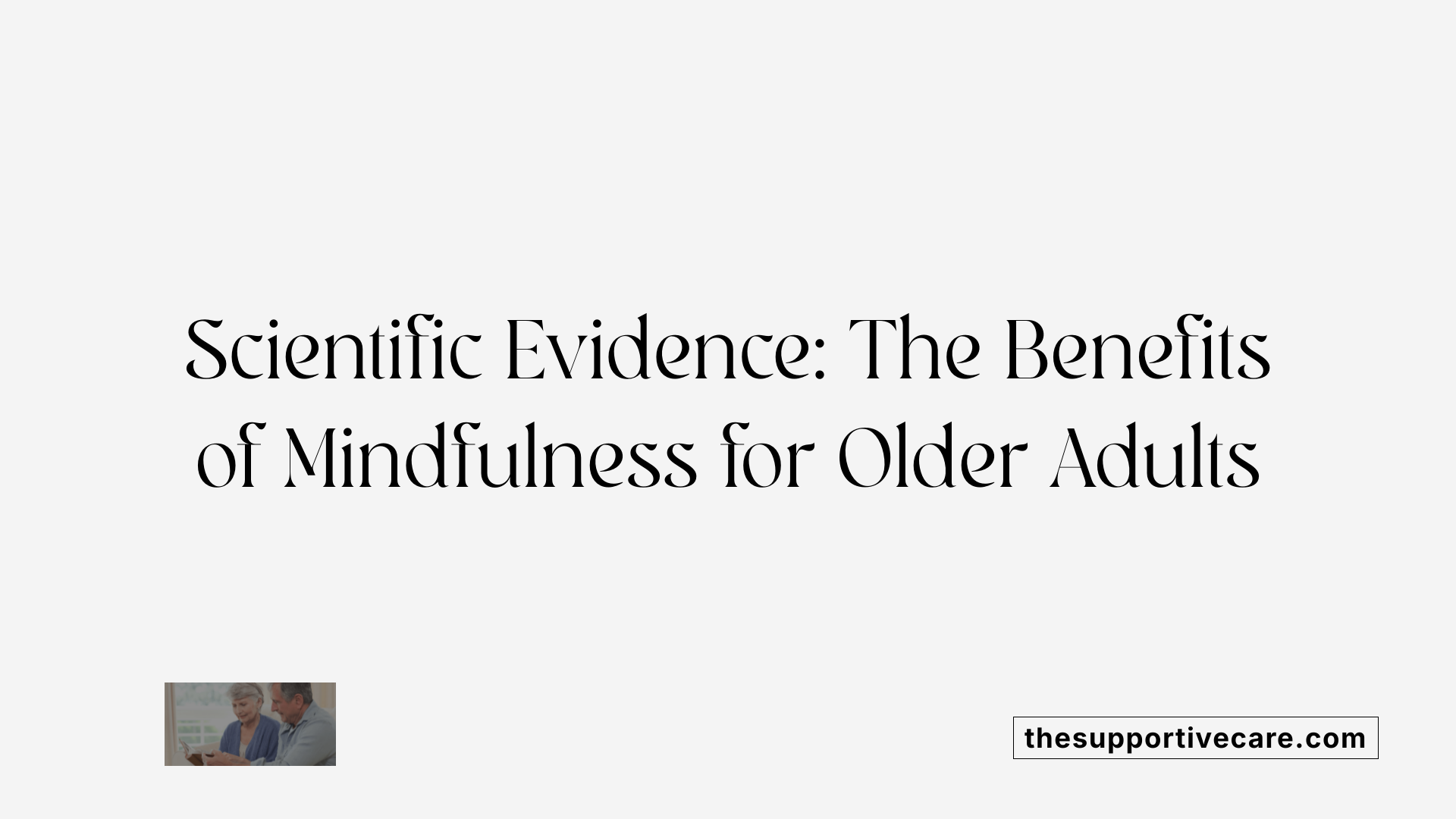
What evidence supports the use of mindfulness interventions for older adults?
Research consistently shows that mindfulness-based interventions (MBIs) offer numerous benefits for older adults' mental and physical health. Recent meta-analyses, encompassing 46 studies, reveal that practices like Mindfulness-Based Stress Reduction (MBSR) and Mindfulness-Based Cognitive Therapy (MBCT) produce modest yet meaningful improvements in emotional well-being.
Effect sizes from these studies typically range from 0.25 to 0.36, indicating small to moderate positive effects on mental health outcomes. Specifically, targeted mindfulness interventions have shown significant success in reducing symptoms of depression, anxiety, and stress among seniors. For instance, some programs designed for older populations—such as brief, tailored mindfulness sessions—have demonstrated improvements in facets of mindfulness like non-reactivity and awareness.
In addition to emotional health, scientific evidence supports cognitive benefits. Older adults engaging in regular mindfulness practice have reported enhancements in cognitive control, reaction time, and emotional regulation. These outcomes suggest that mindfulness can help mitigate age-related cognitive decline and foster resilience.
The strength of this evidence lies in rigorous, peer-reviewed studies that highlight the potential of MBIs to promote healthier aging. Overall, the research underscores that mindfulness interventions are both feasible and effective for seniors, encouraging their integration into mental health care and community programs for older populations.
| Study Type | Key Findings | Effect Size (g) | Focus Area | Reference |
|---|---|---|---|---|
| Meta-analyses | Reduced depression, anxiety, stress | 0.25–0.36 | Emotional well-being | (Recent publications in reputable journals) |
| Randomized Trials | Improved mindfulness facets | Varies | Mindfulness skills | (Examples include MBIS program) |
| Cognitive Studies | Better cognitive control & reaction time | Not specified | Cognitive health | (Latest neuropsychological research) |
Implementing evidence-based mindfulness practices can significantly contribute to the holistic well-being of older adults, supporting their mental and physical health as they age.
Supportive Effects of Mindfulness on Mental and Emotional Health
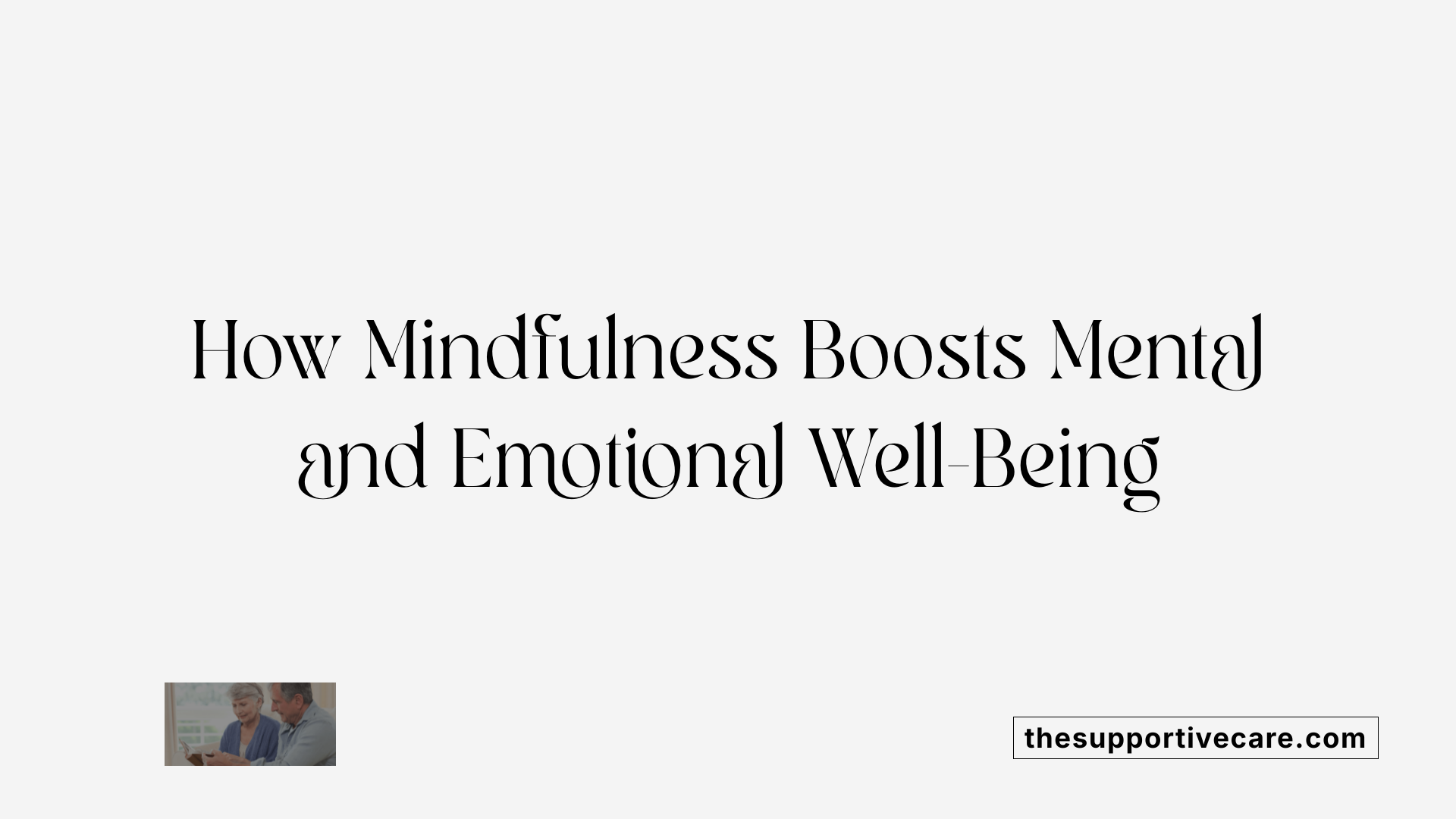
How does mindfulness support mental health and emotional regulation in seniors?
Mindfulness plays a crucial role in enhancing mental health and emotional regulation among older adults. By encouraging individuals to be fully present and attentive to their current thoughts, feelings, and bodily sensations, mindfulness helps reduce negative emotional states like anxiety, depression, and stress.
Practicing mindfulness fosters acceptance of one's experiences without judgment, which is especially beneficial for seniors facing challenges such as health issues and social isolation. This acceptance leads to increased emotional stability and resilience, helping seniors respond more adaptively to life's difficulties.
Incorporating activities such as guided meditation, mindful breathing, or gentle movement like yoga or tai chi can significantly improve mood and self-awareness. These practices also bolster social connection by promoting shared experiences in group settings, thereby fostering a sense of community and mutual support.
Research supports that regular engagement in mindfulness interventions can reduce psychological suffering. It not only alleviates symptoms of anxiety and depression but also contributes to physical health, including better sleep and pain management. Making mindfulness part of daily routines—through simple techniques like mindful eating, walking, or gratitude exercises—empowers seniors to maintain emotional balance and live more fulfilling lives.
The Importance of Mindfulness in Elderly Care Settings
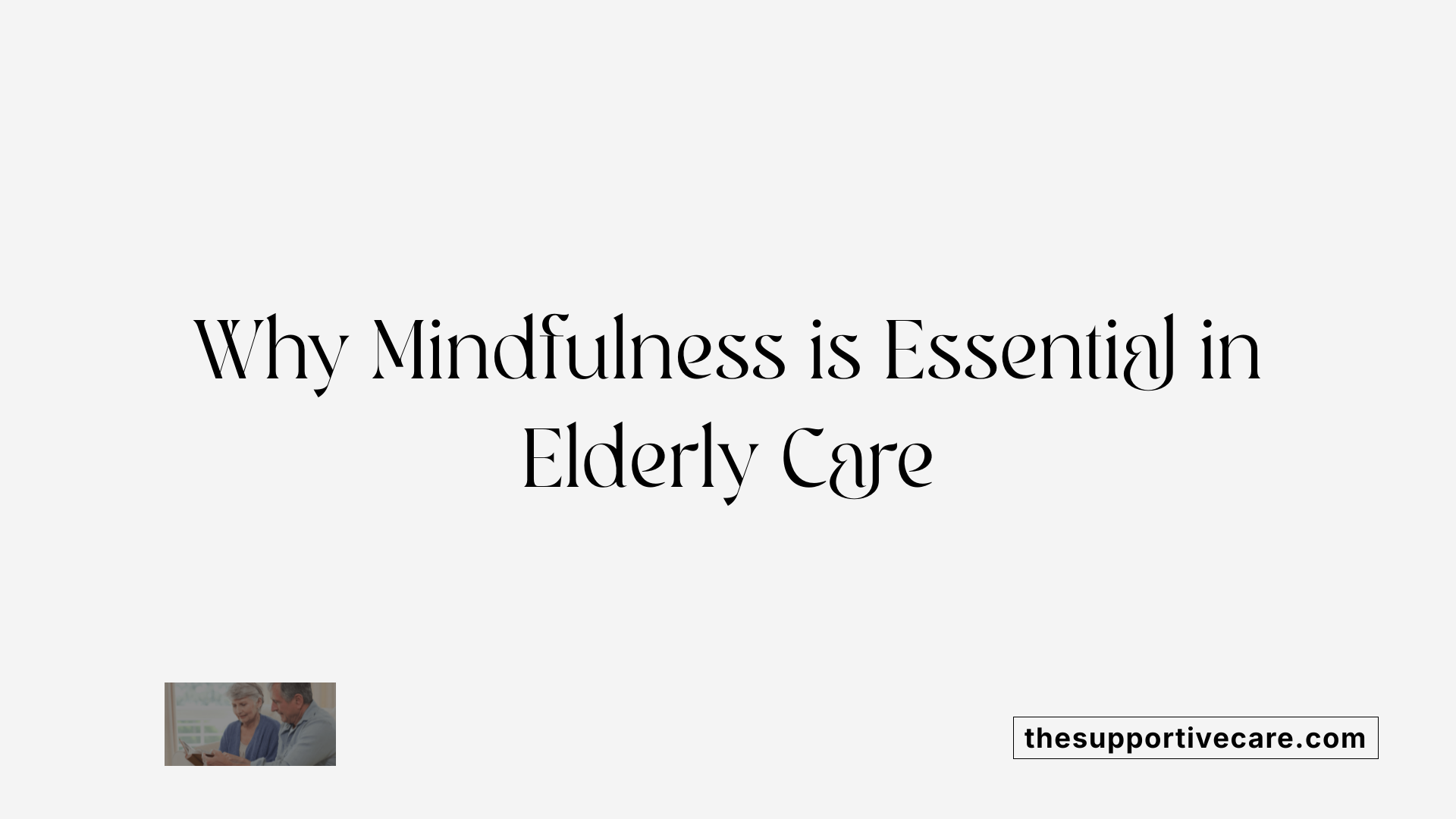
Why are mindfulness activities important in elderly care settings?
Mindfulness activities are vital in elderly care because they support mental and physical health by helping older adults stay present, engaged, and accepting of their current circumstances. These practices assist seniors in managing stress, reducing feelings of loneliness, depression, and anxiety, which are common in aging populations.
Research shows that mindfulness encourages emotional clarity and resilience, making it easier for seniors to navigate changes such as health issues or loss of loved ones. Techniques like meditation, yoga, and sensory awareness are adaptable, allowing participation across various mobility and cognitive levels. They also promote physical wellbeing through gentle movement, pain acceptance, and improved sleep quality.
Furthermore, integrating mindfulness activities fosters social connection and emotional strength. Group sessions and shared practices not only improve mental health but also build a sense of community and support among residents. Overall, mindfulness enhances holistic wellness—helping seniors enjoy a higher quality of life with greater independence and emotional stability.
| Aspect | Benefit | Example Practices |
|---|---|---|
| Mental health | Reduces anxiety, depression, loneliness | Guided meditation, deep breathing |
| Physical health | Pain management, better sleep, circulation | Gentle yoga, mindful walking |
| Social connection | Fosters community, reduces isolation | Group mindfulness sessions, sharing gratitude |
| Emotional resilience | Enhances coping skills | Reflection exercises, loving-kindness meditation |
Implementing mindfulness in elderly care creates a supportive environment that nurtures mind, body, and spirit, contributing to healthier and happier aging.
Core Learning Components of Mindfulness for Seniors
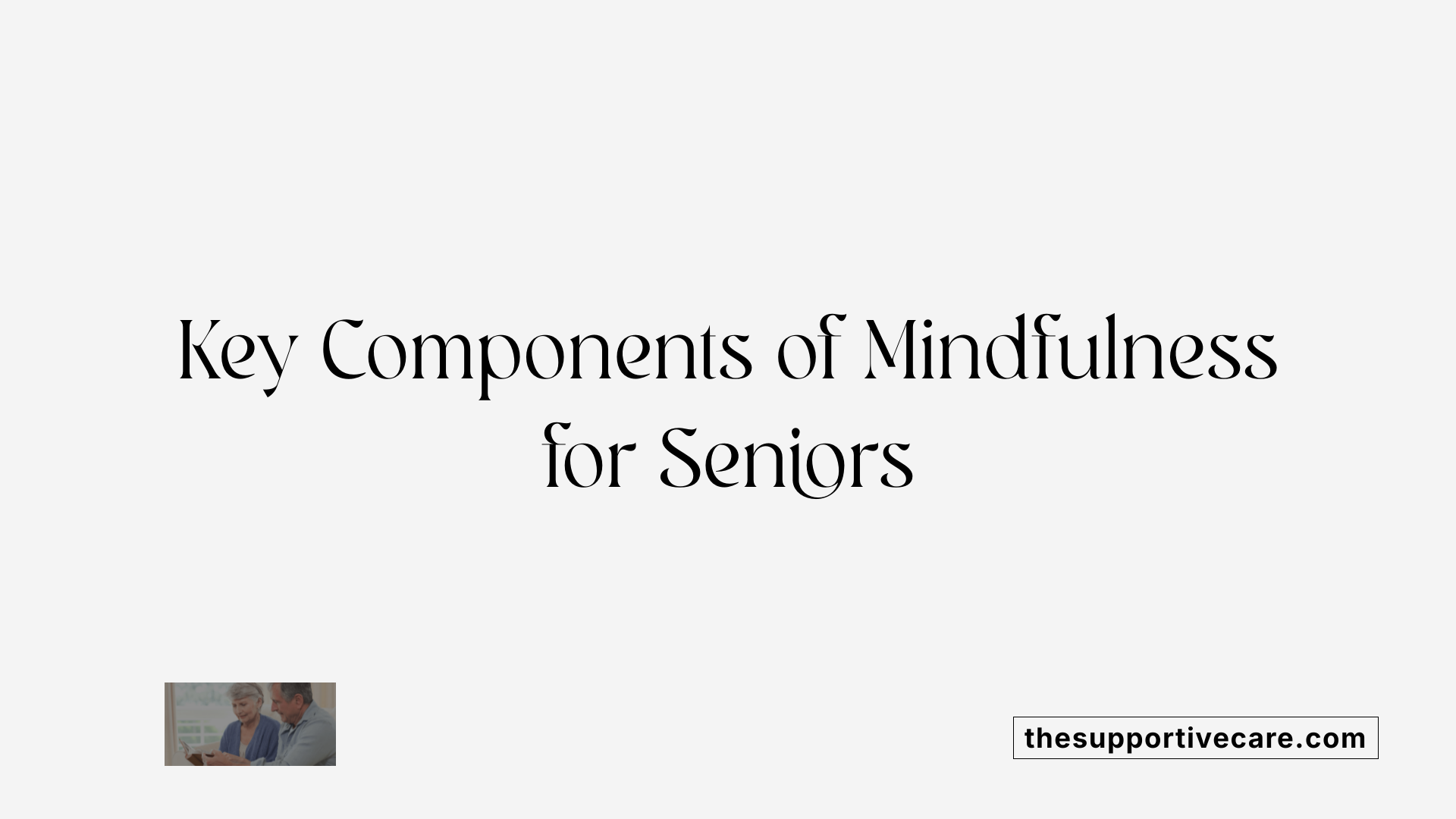 What are the core components of mindfulness that can be taught to seniors?
What are the core components of mindfulness that can be taught to seniors?
Mindfulness for seniors involves several fundamental elements that help improve emotional and mental well-being. One key component is recognizing current thoughts and feelings without judgment. This means learning to notice emotions or ideas as they arise, fostering awareness and acceptance.
Relaxation techniques such as deep breathing or gentle body scans are also essential. These methods help calm the mind and physical body, reducing stress and tension effectively. Practicing slow, intentional breathing helps regulate oxygen flow, slow the heart rate, and create a sense of calm.
Another important aspect is calmly reviewing situations. This involves observing and reflecting on life events or feelings with a clear, non-reactive perspective. Such calm review helps seniors process their experiences without becoming overwhelmed.
Responding thoughtfully rather than reacting impulsively is a critical skill. Mindfulness encourages pausing before acting, allowing for more considered and intentional responses. It enhances emotional regulation and resilience.
Finally, returning to present-moment awareness is the cornerstone of mindfulness practice. Regularly bringing focus back to the current experience fosters stability, prevents rumination, and promotes mental clarity.
These components are often structured in simple routines like the Five R’s or the Four R’s—Rest, Release, Relief, and Renew—designed to guide seniors through short, effective mindfulness practices.
Teaching these core skills in an accessible, gentle manner supports seniors to incorporate mindfulness into daily life. Quick practices lasting just a few minutes, such as mindful breathing or brief reflections, help build consistency and confidence.
Overall, these elements collectively promote resilience, emotional balance, and mental clarity, making mindfulness a practical tool for aging gracefully and maintaining well-being.
A Path to Resilient Aging
Incorporating mindfulness into senior behavioral health care offers a holistic approach that addresses both mental and physical health challenges faced by older adults. Supported by extensive research, these practices promote emotional regulation, reduce stress and anxiety, improve sleep quality, and enhance overall well-being. Practical exercises, adapted techniques, and mindful routines tailored to seniors' needs ensure accessibility and foster a sense of community and resilience. As more healthcare facilities and communities adopt mindfulness programs, seniors can experience meaningful improvements in their quality of life, promoting healthy aging and emotional stability well into later years.
References
- Mindfulness-Based Interventions for Older Adults: A Review of the ...
- Why Seniors Need Mindfulness: A Simple Guide to Better Mental ...
- Incorporating Mindfulness and Meditation in Seniors' Daily Routine
- Promoting Mental Wellness in Senior Communities
- The Benefits of Mindfulness and Meditation for Seniors
- The Power of Mindfulness: The Secret to Good Mental Health in Aging
- Mindfulness and Mental Well-Being in Senior Living



































































































